(Furd
Siud Tzoc Furd Ying Tzerng Ging)
(Taisho
Tripitaka 692)
The Buddha arrived in Yim-Wai nation, where
there was a grove belonging to Kausika. At that time the king, named Udayana,
was fourteen years old. When he heard the Buddha's arrival, the king ordered
his ministers and attendants to prepare his carriage. The king then went to
welcome the Buddha.
Seeing the Buddha from a distance the
king's heart leapt with joy. The king immediately alighted from his carriage
and proceeded on foot, taking leave of his ministers, attendants, and those who
carry his parasol. The king then greeted the Buddha, touching his forehead to
the Buddha's feet and circling him three times. Then, kneeling with palms
joined respectfully together, he addressed the Buddha saying: "In the
heavens above and in the regions beneath heavens, there are no one who compare
to the Buddha. The face, eyes, and body of the Buddha now shine forth
magnificently, and I never weary for a moment of gazing upon the Buddha. The
Buddha is the teacher of all those in the heavens above and in the regions
beneath heavens. The Buddha's compassionate heart cares for countless living
beings."
The Buddha, remaining silent, did not
respond.
The king addressed the Buddha further
saying: "When people perform virtuous acts they gain good fortune, but
where does this lead them? I dread no longer being able to look upon the Buddha
after the Buddha gone. I want to produce an image of the Buddha to venerate and
bequeath to later generations. What sorts of good fortune will I obtain
thereby? I ask the Buddha take compassion upon me and explain this matter, as I
earnestly desire to understand."
The Buddha said: "Young king, your
question is excellent indeed. Listen to what I say, and having heard it, take
it to heart." The king said: "Yes, I am ready to receive this
teaching."
The Buddha said to the king: I will teach
you of the good fortune to be gained by one who produces an image of the
Buddha." The king said: "I am grateful."
The Buddha said: "A person of this
world who produces an image of the Buddha will, in a later life, have clear
eyes and a handsome appearance; his body, hands, and feet will always be
excellent. One born in heaven will also be exceptional among the gods in his
purity, with exquisite eyes and countenance. Such is the fortune obtained by
one who produce an image of the Buddha."
"The place in which one who produces
an image of the Buddha is born is devoid of defilement; the bodies of those
born there are flawless. After death he will attain birth in the seventh Brahma
heaven. Moreover, surpassing all the other gods, his handsome appearance and
beauty will be without peer, and he will be honored by all the gods. Such is
the fortune obtained by one who produces an image of the Buddha."
"One who produces an image of Buddha
will be born to a noble family, with resources far surpassing those of people
in this world. He will not be born a child to a poor or destitute family in a
later life. Such is the fortune obtained by one who produces an image of the
Buddha."
"The body of one who produces an image
of the Buddha will, in a later life, always be the color of the purest gold,
handsome without peer.
"One who produces an image of the
Buddha will most certainly be born to a wealthy family, with money and precious
jewels beyond reckoning. He will always be loved by his parents, siblings, and
relative. Such is the fortune obtained by one who produces an image of the
Buddha.
"If a person who produces an image of
the Buddha will be born in Jambudvipa in his later lives, he will often be born
in the families of emperors or princes, or born a child to a family of great
virtue. Such is the fortune obtained by one who produces an image of the
Buddha.
"One who produces an image of the
Buddha will, in a later life, become an emperor. He will be the most honored
and celebrated among all the monarchs, the one in whom all other monarchs take
refuge and pay homage. Such is the fortune obtained by one who produces an image
of the Buddha.
"One who produces an image of the
Buddha will, in a later life, become a wheel-turning king, able to ascend to
Heaven and return at will. He will accomplish whatever he sets out to do. Such
is the fortune obtained by one who produces an image of the Buddha.
"One who produces an image of the
Buddha will, in a later life, be born in the seventh Brahma Heaven. His live
will span one kalpa and his wisdom will be without equal. One who produces an
image of the Buddha will never again be born in any of the evil paths(*) after
death. He will always guard his chastity, and his thoughts will always be on
his desire to follow the Buddhist path. Such is the fortune obtained by one who
produces an image of the Buddha.
(* evil paths: such as becoming an animal,
hungry ghost, or hell being)
"One who produces an image of the
Buddha will, in a later life, always honor the Buddha and revere the
scriptures. He will continually make offerings to the relics of the Buddha of
variegated silk, fine flowers, exquisite incense, lamps, and all the precious
jewels, and rare objects of the world. Afterwards for innumerable kalpas he
will gain the path to Nirvana. Those who aspire to present precious jewel to
the Buddha are not common men; they have all practiced the Buddhist path in
previous lives. Such is the fortune obtained by one who produces an image of
the Buddha.
"One who produces an image of Buddha
will, in later life, attain such wealth that there never will come a time when
it will be exhausted; nor such wealth be calculated. It is, perhaps, possible
to measure the water in all the rivers and oceans of the four quarters by
measuring it out by the gallon. But the wealth attained by one who produces an
image of the Buddha exceed the amount of water in the rivers and oceans of the
four quarters by a factor of ten. In his future life he will be honored an
protected by all. One produces an image of the Buddha can likened to one who,
during a downpour, has a fine shelter -- he has nothing to fear.
"One who produces an image of the
Buddha will, after death, never again be born in one of the evil paths, be it
hell, the animal realm, or the realm of hungry ghosts. One who sees an image of
the Buddha and, with a pious heart, joins palms together and takes refuge in the
Buddha's stupa or his relics, will not, at death, reenter the realms of hell,
animals, or hungry ghosts for one hundred kalpas. Rather, at death he will be
born in heaven, and, when his long life in heaven is complete, he will once
again descend into the world as the child of a wealthy family, with
immeasurable precious jewels and rare objects. Afterward he will certainly
attain the path of Buddhist Nirvana."
The Buddha told the king: "To produce
an image of Buddha is a worthy deed, and good fortune obtained thereby is,
without exaggeration, such as I have explained." The king was pleased and
bowed before the Buddha, touching his forehead to the Buddha's feet. The king
and all his ministers then bowed to the Buddha and took their leave. At the end
of their long lives they were all reborn in the world of Amitabha Buddha.
(Revised Based on Robert H. Sharf's
translation)











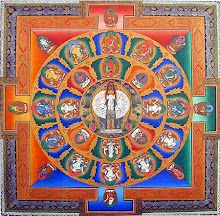




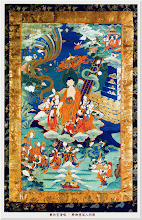

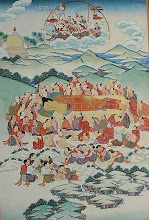


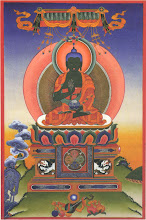




.jpg)

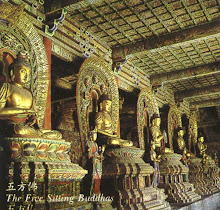













No comments:
Post a Comment